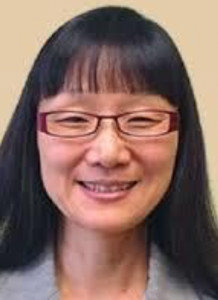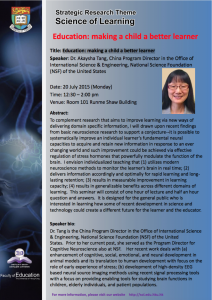Education: making a child a better learner

Speaker: Dr. Akaysha Tang, China Program Director in the Office of International Science & Engineering, National Science Foundation (NSF) of the United States
Date: 20 July 2015 (Monday)
Time: 12:30 – 2:00 pm
Venue: Room 101 Runme Shaw Building
Abstract
To complement research that aims to improve learning via new ways of delivering domain specific information, I will drawn upon recent findings from basic neuroscience research to support a conjecture–it is possible to systematically improve an individual learner’s fundamental neural capacities to acquire and retain new information in response to an ever changing world and such improvement could be achieved via effective regulation of stress hormones that powerfully modulate the function of the brain. I envision individualized teaching that (1) utilizes modern neuroscience methods to monitor the learner’s brain in real time; (2) delivers information accordingly and optimally for rapid learning and long-lasting retention; (3) results in measurable improvement in learning capacity; (4) results in generalizable benefits across different domains of learning. This seminar will consist of one hour of lecture and half an hour question and answers. It is designed for the general public who is interested in learning how some of recent development in science and technology could create a different future for the learner and the educator.
Speaker bio
Dr. Tang is the China Program Director in the Office of International Science & Engineering, National Science Foundation (NSF) of the United States. Prior to her current post, she served as the Program Director for Cognitive Neuroscience also at NSF. Her recent work deals with (a) enhancement of cognitive, social, emotional, and neural development in animal models and its translation to human development with focus on the role of early experience of stress; (b) development of high-density EEG based neural source imaging methods using recent signal processing tools with a focus on providing enabling tools for studying brain functions in children, elderly individuals, and patient populations.



